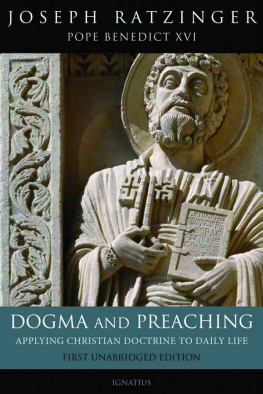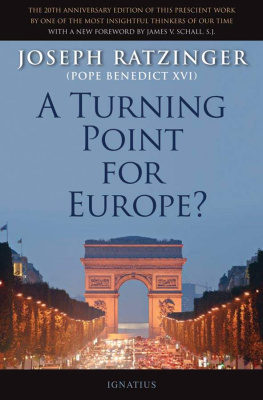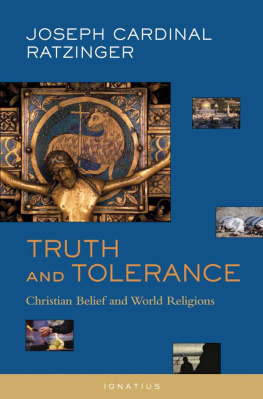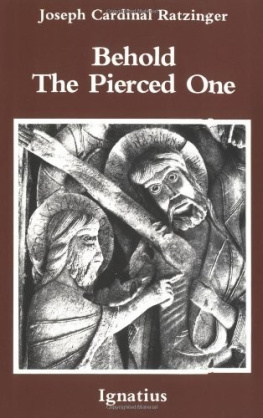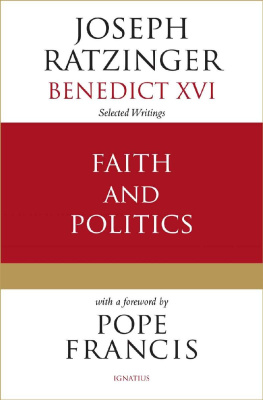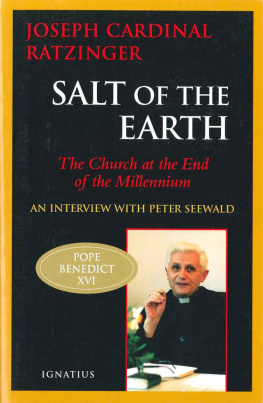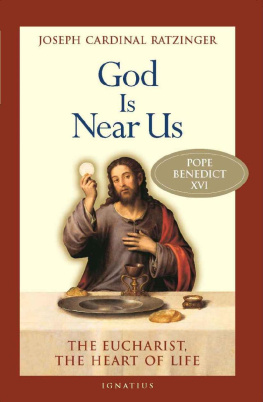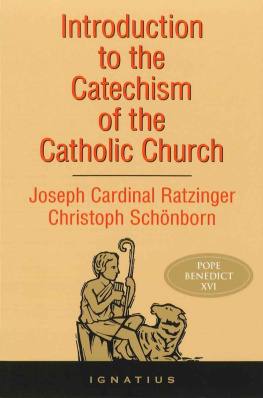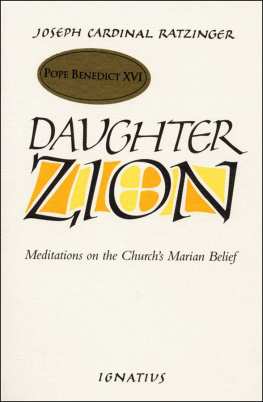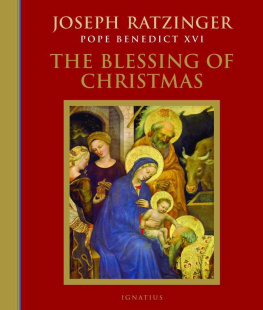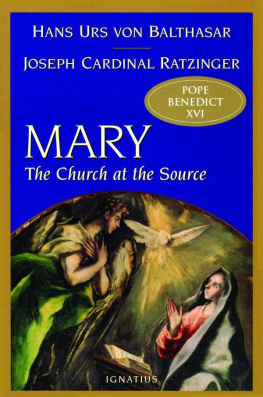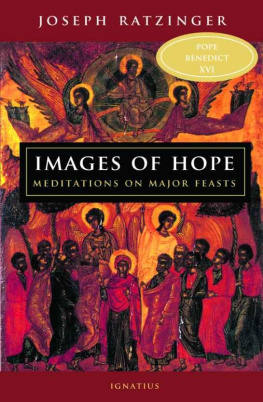Joseph Cardinal Ratzinger - Dogma and Preaching
Here you can read online Joseph Cardinal Ratzinger - Dogma and Preaching full text of the book (entire story) in english for free. Download pdf and epub, get meaning, cover and reviews about this ebook. year: 2012, publisher: Ignatius Press, genre: Religion. Description of the work, (preface) as well as reviews are available. Best literature library LitArk.com created for fans of good reading and offers a wide selection of genres:
Romance novel
Science fiction
Adventure
Detective
Science
History
Home and family
Prose
Art
Politics
Computer
Non-fiction
Religion
Business
Children
Humor
Choose a favorite category and find really read worthwhile books. Enjoy immersion in the world of imagination, feel the emotions of the characters or learn something new for yourself, make an fascinating discovery.
- Book:Dogma and Preaching
- Author:
- Publisher:Ignatius Press
- Genre:
- Year:2012
- Rating:5 / 5
- Favourites:Add to favourites
- Your mark:
- 100
- 1
- 2
- 3
- 4
- 5
Dogma and Preaching: summary, description and annotation
We offer to read an annotation, description, summary or preface (depends on what the author of the book "Dogma and Preaching" wrote himself). If you haven't found the necessary information about the book — write in the comments, we will try to find it.
Joseph Cardinal Ratzinger: author's other books
Who wrote Dogma and Preaching? Find out the surname, the name of the author of the book and a list of all author's works by series.
Dogma and Preaching — read online for free the complete book (whole text) full work
Below is the text of the book, divided by pages. System saving the place of the last page read, allows you to conveniently read the book "Dogma and Preaching" online for free, without having to search again every time where you left off. Put a bookmark, and you can go to the page where you finished reading at any time.
Font size:
Interval:
Bookmark:
DOGMA AND PREACHING
Benedict XVI
Joseph Ratzinger
Preaching
Applying Christian Doctrine
to Daily Life
UNABRIDGED EDITION
Translated by Michael J. Miller
and Matthew J. OConnell
Edited by Michael J. Miller
IGNATIUS PRESS SAN FRANCISCO
From the fourth edition of the German original:
Dogma und Verkndigung
2005 by Erich Wewel Verlag, Donauwrth
Front cover art:
Saint Peter , detail from the facade. 1160-1180. Romanesque.
St. Trophime, Arles, France
Andrea Jemolo / Scala / Art Resource, New York
Back cover photograph of Pope Benedict XVI by Stefano Spaziani
Cover design by Roxanne Mei Lum
2011 Ignatius Press, San Francisco
All rights reserved
ISBN 978-1-58617-327-2
Library of Congress Control Number 2011905247
Printed in the United States of America
Dedicated to Hans Urs von Balthasar with respect and gratitude
The path from dogma to preaching has become very difficult. There are no longer any patterns of thought and assumptions that carry the content of dogma into everyday life; it is too much to demand of the individual preacher, however, that he himself should figure out each time the entire path from the doctrinal formula to its core and from there back to contemporary language. Should we not instead leave out dogma entirely? With such a radical cure, which appears to many today to be the only way out, preaching becomes speaking in ones own name and loses all objective interest whatsoever, as Erik Peterson has strikingly and incontestably demonstrated from the painful experiences of crumbling liberal theology ( Was ist Theologie ? [Bonn, 1926]). The inner tension of preaching depends on the objective arch spanning and upheld by the pillars: Dogma-Scripture-Church-Today; not one of them can be taken away without the whole thing eventually collapsing.
If that is how matters stand, theology cannot be satisfied with reflecting on the faith in the Elysian fields of academe while otherwise leaving the preacher to his own devices. It has to provide everyday life with signposts and find paradigms for translating reflection into proclamation; thought is proved only when it can be expressed. This volume seeks to serve as a contribution to the development of a material kerygma. The fragmentary writings of which it is composed grew out of discussions with pastors or from my own attempt to speak pastorally in homilies, on radio, and in newspapers. This resulted in its structure: fundamental reflections on the path of proclamation, essays on particular subject areas, and attempts at practical application. This could amount to no more than an initial approach to a large task; still, perhaps the realism of the situations from which the whole thing grew may compensate somewhat for the lack of systematic method and completeness.
I am grateful to Miss Karin Bommes for preparing the index of names and biblical citations.
Regensburg, February 1973
Joseph Ratzinger
PART ONE
Toward a Theory of Preaching
PART TWO
Some Major Themes of Preaching
PART THREE
Meditations and Sermons
PART ONE
Toward a Theory of Preaching
1. Church as the Place of Preaching
Talking about the crisis in preaching has already become commonplace today. The What, How, and Where of preaching have become, as it were, questionable; various kinds of attempts at reform are offered, from flight into strict biblicism to unadulterated congregational conversation in which those present merely exchange their opinions and possibly seek guidelines for action in common based on opinions they have worked out together. The central fact behind all this is the crisis of ecclesial consciousness. Whereas formerly no one doubted that Church was the standard and locus of preaching, now she stands almost as an obstacle to it: preaching, it seems, must become a critical corrective to Church instead of being subordinate to her and allowing her to be normative. In this situation it might be necessary to inquire into the historical and material point of departure of Christian preaching in general, so as to reestablish its coherence on that basis. How, then, does preaching come about? What are its origin and its purpose?
1. The Development of the Basic
Types of Preaching in the Old Testament
No sooner do we ask this question than it takes us back beyond the New Testament into the Old, for without the historical path of the latter, the New Testament message remains inexplicable. In the Old Testament, if I am looking at it correctly, we can find three principal roots of preaching. The first is found in the area of the Torah, Israels ordinances for worship and living. The classical Old Testament liturgy, as portrayed paradigmatically in Exodus 24:5-8, includes two aspects: the burnt offering and the reading from the book of the covenant, the proclamation of the divine law for Israel. The saying about Levi in Deuteronomy 33:8ff. presupposes the same thing: the priests present the offerings and teach Israel Gods law. Here preaching as instruction for a life according to the ways of Yahweh is one part of the priestly ministry included in the form of divine worship that is shaped by Gods law itself. The worship of God in Israel never has a merely cultic-sacrificial character; it is aimed at man as a covenant partner. Only in his living justice is service to Yahweh performed and worship complete. Preaching, as guiding all of life into the covenant and in terms of the covenant, is part of divine worship; it is divine worship. And conversely: divine worship takes place precisely in the act of bringing Gods will to bear upon man, in the word that becomes for man the way.
In view of the extensive failure of priestly preaching, a second ministry of proclamation becomes increasingly prominent: that of the prophet who has been called and aroused by God himself, the prophet who inculcates precisely this character of word and reality of faith in Yahweh. Although the spontaneous and charismatic element becomes quite important here in comparison to the institutional element, the prophet nonetheless does not stand autonomous and aloof with regard to Israels faith history. Prophecy, too, has a sort of institutional character; what really identifies it, however, is that it stands in the continuity of Israels faith and sternly and unrelentingly asserts just this original covenant faith for Israel against all sorts of aggiornamento . Therefore even the prophet does not act outside of Israel but, rather, brings the true Israel to bear, as it is manifest in the faith of the fathers, against the distorted Israel of this or that present moment, and precisely thereby he upholds Israels faith as something open to the future.
We find a third component in the so-called vow psalms, for which we can regard Psalm 22 (21) as a model. The sorely oppressed righteous man pours out all his despair in the sight of Yahweh and begs him to rescue him. The psalm, which begins with the cry of distress of a man who has been forsaken by God and cast down already to the netherworld, then ends according to form with the promise to proclaim Yahwehs mighty deed in the midst of the congregation. That is at first quite an anthropomorphic reason to urge Yahweh to grant his prayer: It is worthwhile, so to speak, for God to save the man, for if he should perish, that would mean the loss of a worshipper (the dead do not praise you), whereas in the case of a rescue, the saved man will proclaim Yahwehs might everywhere and continue to extol and spread abroad his glory. This anthropomorphic beginning then leads to a deeper meaning: the experience of Gods benevolent might urges us to proclaim it, urges us to make a return. Like great good fortune, one cannot keep it to oneself. It urges one to give thanks by way of proclamation. One gives thanks to Yahwehs might by proclaiming it; man passes on the experience of his indebtedness and thus makes it possible for others, too, by adding their thanks, to become sharers in the saving power of Yahweh, to rejoice with him in Yahwehs might. Preaching as thanksgiving ( eucharistia !) meshes here with the worship of God; as testimony to Gods saving power, it is itself divine worship, and by its testimony it calls man into divine worship and yet at the same time gives him therein salvation and redemption.
Next pageFont size:
Interval:
Bookmark:
Similar books «Dogma and Preaching»
Look at similar books to Dogma and Preaching. We have selected literature similar in name and meaning in the hope of providing readers with more options to find new, interesting, not yet read works.
Discussion, reviews of the book Dogma and Preaching and just readers' own opinions. Leave your comments, write what you think about the work, its meaning or the main characters. Specify what exactly you liked and what you didn't like, and why you think so.

